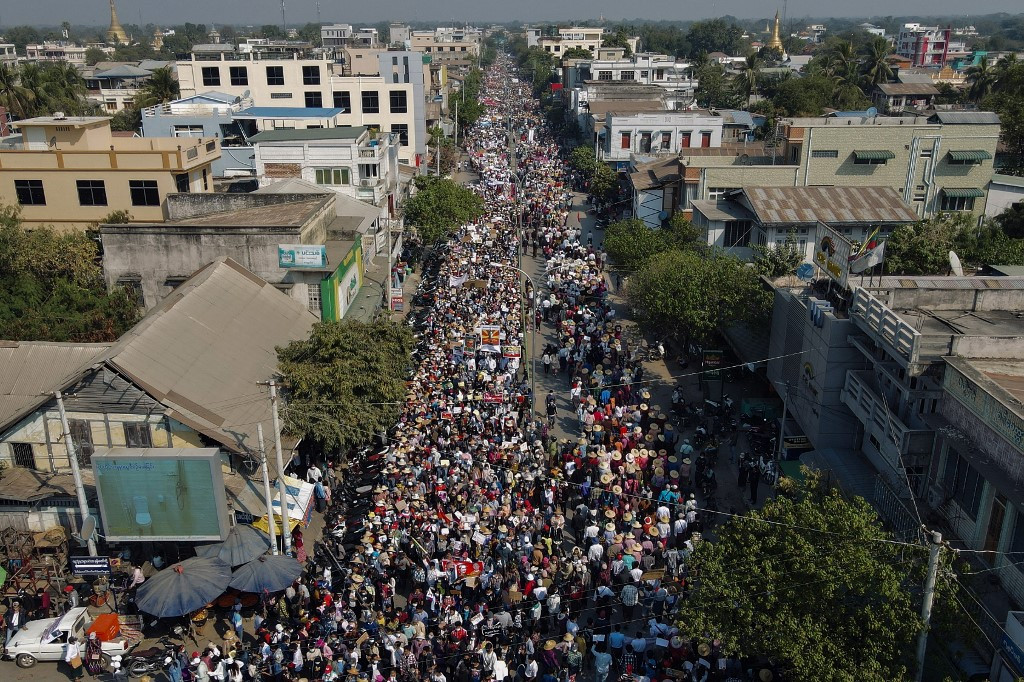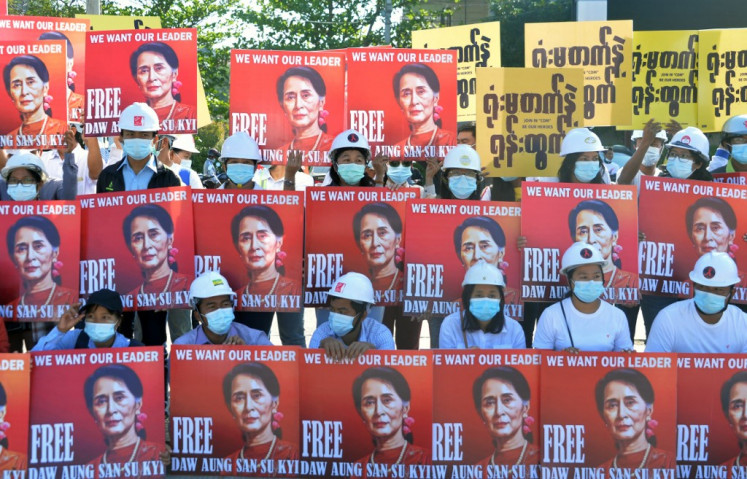Popular Reads
Top Results
Can't find what you're looking for?
View all search resultsPopular Reads
Top Results
Can't find what you're looking for?
View all search resultsQuiet diplomacy afoot as tensions rise in Myanmar
ASEAN rushes to prevent situation from further unraveling
Change text size
Gift Premium Articles
to Anyone
A
SEAN members like Indonesia have been working the diplomatic channels to set up a special ASEAN ministerial meeting to avert one of the biggest political crises in the region, as civil disobedience continues in Myanmar two weeks after its government was ousted by a military coup.
“Diplomatic efforts are still underway” at various levels, said Indonesian Foreign Ministry spokesperson Teuku Faizasyah in cautious discussions with The Jakarta Post on Monday.
Faizasyah’s statement follows up on suggestions from President Joko “Jokowi” Widodo and Malaysian Prime Minister Muhyiddin Yassin, made during their first official bilateral meeting in Jakarta earlier this month.
The two leaders represent some of Southeast Asia’s biggest democracies, on whom the international community has pinned its hopes to respond to political repercussions from the coup.
Myanmar’s military junta, the Tatmadaw, overthrew the government of civilian leader Aung San Suu Kyi based on unfounded allegations of election fraud in November.
Hundreds of thousands of people in the country were reported to have spilled onto the streets to denounce the military’s derailment of a tentative transition to democracy, but as of Monday, Reuters reported that the crowds had been getting smaller following the junta’s deployment of armored vehicles and more soldiers to guard the streets.
ASEAN member states have come up with a variety of individual responses reflective of their respective political systems, whether authoritarian or democratic, making collective regional action an increasingly delicate matter.
Most recently, Thai Prime Minister Prayut Chan-o-cha, who first seized power in a military coup before fashioning himself into a civilian leader, said on Feb. 10 that he had received a letter from Myanmar’s junta leader asking for help to support democracy.
“We are supportive of the democratic process in Myanmar, but what’s most important [...] is to maintain good relations because it impacts the people, the economy, border trade – particularly now,” Prayut said as quoted by Reuters.
With no direct means to pressure Myanmar, while also bearing in mind the importance of not giving the coup government any legitimacy, experts are wary of the challenge that lies ahead for ASEAN.
Read also: ASEAN voices split over Myanmar military coup
Indonesian foreign policy scholar Dewi Fortuna Anwar insists that ASEAN’s future and reputation are at stake.
“ASEAN will seriously lose its credibility if it does not do anything. ASEAN is guaranteed to have a bad name if it cannot respond to such a crisis,” she said on Monday.
The bloc was supposed to have a mechanism to punish member states who violate the principles enshrined in the ASEAN Charter, but Dewi noted that the provision was omitted during the negotiation process, leaving it without a means to impose sanctions as a collective, including the suspension of membership.
Other regional groupings, such as the African Union, have such mechanisms in place and actively implement them, most recently in August 2020, when Mali was suspended from all activities of the union until a constitutional and civilian rule was reinstated. The suspension was lifted in October.
“Member countries should continue to push for the special summit on Myanmar, and if it is not possible, they could have a ‘coalition of the willing’ within ASEAN to speak on behalf of ASEAN in the ASEAN-minus-X format. […] But just because it is hard to make progress, ASEAN cannot be completely silent,” Dewi told the Post.
A group of protesting engineers hold up signs calling for the release of detained Myanmar civilian leader Aung San Suu Kyi during a demonstration against the military coup in Naypyidaw on Monday. (Agence France Presse/Str)The ASEAN-minus-X format is uncommon for discussing political issues, as ASEAN member states prefer to use consensus-building. However, the format has a precedent in discussing economic issues, she added.
As a political settlement is likely to be more complicated, she said ASEAN should prioritize calls for restraint and allow peaceful protests in Myanmar, which would require external supervision.
Member countries are also urged to continue engaging with ASEAN dialogue partners, including the United States, China and the European Union, to ensure effective sanctions.
“We don't want the issue of Myanmar to be the bone of contention in the US-China rivalry because it won't solve the problem,” she said, noting how if the region was split over the issue, ASEAN would lose its centrality and destabilize the wider region as a whole.
US President Joe Biden announced last week his plans to sanction Myanmar’s military leaders, which will not only affect the individuals but also their business interests and close family members.
Read also: Dance Dance Revolution: Viral coup video unwittingly spotlights Indonesia’s affinity to Myanmar
He also said the US would also impose "strong export controls" and will prevent the generals from improperly having access to the US$1 billion in Myanmar government funds held in the US.
Meanwhile, other countries such as New Zealand had gone as far as to suspend all high-level contact with Myanmar and impose a travel ban on its military leaders.
Indonesian Institute of Sciences (LIPI) researcher Nanto Sriyanto said it remained to be seen whether US sanctions would be an effective deterrent.
Prior to the coup, regional powers such as India and Japan engaged Myanmar through various economic cooperation with the hope of further integrating the country into the existing regional order.
However, the potential for economic isolation is not likely to show any significant effect.
“I think pressure from government to government won’t be very successful because the military government has already ‘taken root’ and finds [isolation] as something that is entirely normal,” Nanto told the Post on Monday.
Instead, he suggested there should be a combination of engagement between governments and among the civil society networks.
“The important thing is to keep the information and communication channels open to Myanmar,” he said.
Another possibility would be to leverage the recently established Regional Comprehensive Economic Partnership agreement or the deployment of ASEAN’s human rights body, said Rachel Arinii from FORUM-ASIA.
“We also regret that the Philippines as a member of ASEAN in the Human Rights Council did not sponsor the Myanmar [multilateral] resolution and considered this issue a domestic issue,” she said on Monday.











